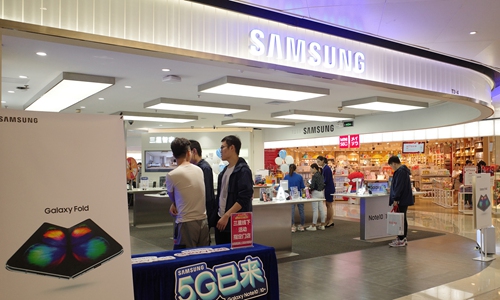Huawei decision tests Samsung's wisdom
By GT staff reporters Source: Global Times Published: 2020/8/21 18:48:40
Timely support to help firm regain fame, market share in China market

Consumers pick up phones at a Samsung booth in a shopping mall. Photo: IC
Samsung can make a wise choice and maintain its cooperation with Huawei amidst the US chip ban, as the firm, which has been "deeply" relying upon China, can take this opportunity to regain its market share by "supporting" Huawei, especially when a visit to South Korea by a senior Chinese diplomat sends positive signs for bilateral ties, observers said.
The South Korean tech giant should also weigh whether it could afford plunging revenue if Huawei, one of the major purchasers of its memory products, turns its back on the company, analysts said.
Yang Jiechi, director of the Office of the Foreign Affairs Commission of the CPC Central Committee, will consult with officials in the South Korean city of Pusan from Friday to Saturday, at the invitation of Suh Hoon, South Korea's top national security adviser.
The ongoing high-level exchange also comes as the technology confrontation between China and the US becomes more intense, with some forecasting that issues such as Huawei could be included in the agenda, as South Korea holds an important position in the global semiconductor industrial chain.
South Korea maintains a very close economic relationship with China, and the country's economic development is closely intertwined with China's industrial chain in every way, Ma Jihua, a veteran industry analyst, told the Global Times on Friday, indicating that any blow felt by China could also be felt by South Korean firms in the semiconductor sector.
In April, while many countries in the world still imposed tight border restrictions, China and South Korea established a personnel exchange "fast passage" to maintain trade cooperation and ensure the supply chain remained open between the two countries amid the COVID-19 pandemic, reflecting the close economic ties between the two neighbors.
Even as the US intensifies its bans, it's possible the two countries, and also Huawei and Samsung, may still cooperate in some "low-profile" way, Ma said.
The US Department of Commerce on Monday issued a new rule that would prevent Huawei from acquiring chips developed or produced using US technology and software, in a move that analysts said essentially cuts off supplies of key components for its smartphones. The new rule was an extension of an earlier ban imposed in May that prevents companies using US technology and software to make chips designed by Huawei.
If Samsung could help Huawei get through these difficult times "in some way," the South Korean firm could greatly improve its prestige and regain its lost fame in the Chinese market, experts noted.
China represents over 70 percent of Huawei's smartphone shipments, while Samsung's only has a one percent market share in China, and is far more exposed to markets that are still being damaged by the pandemic, including Brazil, India, the US and Europe, Canalys, a market analyst firm, said.
When China first proposed its own 3G standard, the TD-SCDMA in 2008, Samsung, the world's third largest smartphone maker at the time, stepped out and voiced its support while others turned a blind eye. It has since occupied a rising smartphone market share and improved its brand awareness in the Chinese and international markets.
The growing momentum came to a halt after South Korea installed the remaining launchers of the US anti-missile Terminal High Altitude Area Defense (THAAD) system in 2017, which China strongly opposed and led to cooling ties.
"Samsung can also make the right choice this time," Ma said.
Samsung has not responded to an interview request from the Global Times as of press time on Friday.
Although it's still not yet clear how the amended restrictions will affect major South Korean suppliers such as Samsung and SK Hynix's relationship with Huawei, cutting off the supply chain would come at a huge cost, as both tech firms fetch about 10 trillion won ($8.4 billion) annually by supplying DRAM and NAND flash to the Chinese tech giant, local media reported.
Huawei has been one of Samsung's top-five sources of revenue.
"Unlike chips, Chinese firms have already done a good job in the memory sector, but if a big customer like Huawei turns its back on domestic firms, it would create a chance for domestic memory firms," an industry player, who asked to remain anonymous, told the Global Times on Friday.
"Chinese memory firms were caught in a development dilemma as their South Korean counterparts have occupied global dominance for a long time," the person said, noting that he's confident the domestic industry could result in products "as good as those made by Samsung."
South Korean firms would regret the choice if they are made to follow the US and leave such a "big pie" to domestic Chinese players, said the industry player.
In the global DRAM market, except for the three giants, namely, Samsung, SK Hynix and Micron, other manufacturers account for only five percent, according to a report from TrendForce sent to the Global Times on Friday.
Posted in: INDUSTRIES,COMPANIES